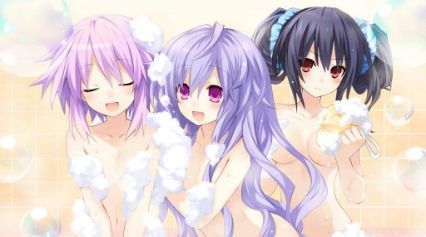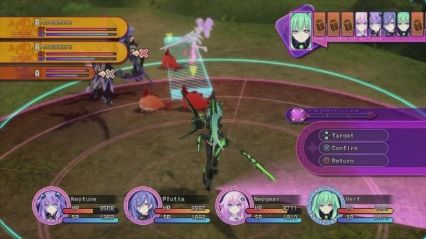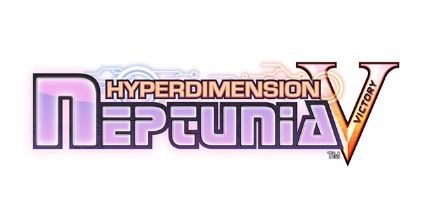- Format: PS3
- Unleashed: March 22nd
- Publisher: NIS America/Reef Entertainment
- Developer: Compile Heart/Idea Factory
- Players: 1
- Site: http://nisamerica.com/games/NeptuniaVictory/
For those unfamiliar with the Hyperdimension Neptunia games, the basic premise is an interesting one. A turn based RPG set in a universe meant as a commentary on the games industry (the world is even called ‘Gamindustri’ with place names such as ‘Lastation’), it’s a series dripping with potential. As this latest entry hammers home however, said potential has been left to ferment until it turns into something horrific that stinks up the place.
So, yes, each domain in this world is governed by a ‘CPU’ representing one of the big console players (with Lowee being governed by a CPU meant to represent Nintendo and the Wii, for example). Names of characters and NPCs are also taken from gaming culture, but are handled in such a ham-fisted way that they’re either blindingly obvious or painfully obscure. One such NPC is called Famitsu and runs a gaming magazine. Depth? What depth? There’s no finesse here at all, and any ideas you already have about how to handle a script based on the games industry and its associated culture are undoubtedly better than the ones implemented here.
Dialogue runs from staggeringly unfunny references to gaming language and the fourth wall, to embarrassing tweenage talk; though it’s impossible to tell how much of this comes down to the translation from the original Japanese. The real problem is that there is a lot of this dialogue. A lot. The story is told via waves and waves of on-screen text (sometimes voiced) accompanied by static pictures. Static, that is, apart from the occasional wobble to indicate movement – and the invariably heaving bosoms of the almost exclusively female cast.
This is at times a highly sexualised game, beyond the impractically revealing clothing that a million heroines are forced to endure on their adventures. There is never any full nudity, but there is one scene (well, picture) where three of the main female protagonists are bathing together nude, with some strategically placed arms and bubbles (see below). The circumstances leading up to this are really rather creepy, doubly so considering one of the girls – in light of her behaviour and language – could potentially have an age in single figures. It’s rather more complicated than you might imagine however.

Each CPU can transform into a super-powerful ‘HDD’ form, and what this means for gameplay we’ll move on to shortly. In the context of the story however, a CPU in her transformed state appears very different (much more sexualised and, thankfully, older). In the case of the girl who seems to be the youngest CPU – Plutia – her HDD form seems to be much older, and her personality also undergoes a transformation. Whilst other CPUs seem to retain their inner selves, Plutia turns from a wide-eyed little girl full of innocent excitement to a perverted, sadomasochistic dominatrix. Yes, exactly. The bathing scene is initiated by Plutia in her transformed state, but takes place when she is her ‘normal’ self – thus she does not see anything sexual in it. There’s still plenty of innuendo however, making for an extremely uncomfortable chain of events overall.
At last turning our backs on the story (which holds appeal only for those who delight in craning their necks to see as much as possible of a fresh car crash), it’s time to see what’s on offer on the more interactive side of things. Answer: nothing worth paying £35-£40 for. Nothing worth paying £3-£4 for, in fact. The tragedy is that the actual combat system has clearly had some time and effort put into it, and might have been a welcome part of a completely different game. Each turn, you choose where to place yourself on the battlefield (within a very limited area) before choosing your action – attack, defend, use item or ability. Where to place yourself alone carries some strategy when, as is almost always the case, you have two or more characters under your control. The aforementioned HDD form offers you a more powerful character to play with, but magic attacks drain the same meter as transformation. You in effect make your own combos, as when attacking you get about four or five hits before your turn ends.
There are other tactical considerations such as the fact that there are three different types of basic attack, a meter for powerful combos which builds up during the fight, and that each enemy has a guard meter which makes it difficult to knock down their health bar until empty. All of this, however, is basically negated by the fact that no matter how well you understand and use the system, you will not progress without grinding. There are plenty of RPGs which demand that you grind, but very few with such a sparse collection of unerringly small and tedious ‘dungeons’ featuring (a very small variety of) infinitely respawning enemies. The game is determined to force you to grind, by launching the difficulty level into the air without warning fairly early on with random ‘infections’ which make enemies ridiculously tough, and bosses with huge health bars which regenerate every turn.

Staring at this picture for three hours is much more fun than playing the game for fifteen minutes.
The warning signs are immediately apparent in the presentation. Lack of cutscenes aside, towns and the world map (both single screen areas) are also almost entirely static, giving the impression of a low-grade Facebook game. Animation is in fact such a precious commodity that on the rare occasions it’s present, the tech struggles to cope, resulting in unstable frame rates (always in dungeons and, remarkably, during one of the almost entirely static story scenes). Even the J-pop music isn’t the irresistibly cheesy kind, but the headache-inducing kind. As for the acting, well… in all honesty, it’s difficult to pass judgement when the actors are handed such a consistently terrible, terrible script.
Incredibly, the Hyperdimension Neptunia series has gathered a small but ferociously hardcore following. If you are not among that number then please, we implore you, steer well clear of this. It’s shocking that such titles still make it to retail in 2013.





“Names of characters and NPCs are also taken from gaming culture, but are handled in such a ham-fisted way that they’re either blindingly obvious or painfully obscure.”
What kind of references do you want, then?
“Masochistic dominatrix”
You’re contradicting yourself.
And you’re complaining about the game’s difficulty being raised when you fight enemies so you have to resort to grinding and buffing? Welcome to RPGs where fumbling around like a fool will get you killed.
If you thought this game was hard then Shin Megami Tensei Nocturne would be the very thing that plagues your dreams, crushes your ego and takes your will to live away.
tl; dr: This review is bad because you don’t know what you want and you complain about a game being hard.
I actually meant to write ‘sadomasochist’ so you’re quite right, I contradict myself as it’s written. [EDIT: now changed appropriately]
As for not knowing what I want, and the implication I’ve never played an RPG, may I turn your attention to my review of (turn based) Persona 4 Golden (9/10). https://criticalgamer.co.uk/2013/02/01/persona-4-golden-review/
I don’t think we played the same game, unless they utterly destroyed it in translation; which would be no surprise knowing NISA’s translation team is so awful it is hilarious as far as comedy goes. While I, an American consumer has not yet gotten to play my localized version of this game; I have played through all endings of the Japanese version, while I would never, under any circumstances suggest this game to someone who “enjoys RPGs”, such as Final Fantasy, Dragon Quest, among others including your aforementioned Persona 4 Golden which is probably about as close to a real JRPG as you have ever gotten; I will not say this is a bad game, in fact; this is one of the few series that actually brings a similar mood in translation from Japanese to other localizations.
I am not sure on the references, however I can imagine sticking a soldering iron in to both of my ears for the duration of the game to be more pleasant than listening to the awful dubbing these people do. Then again, I am what people call a “weeaboo” when they don’t know what a “weeaboo” really is. I prefer the media to be as close to the original product as possible and just for the sake of them including dual audio in their games I think NISA/Compile Heart and the others are some of the only ones who “have it right”.
On the subject of the difficulty; yes, this was a league up on the first and second installments, which were both RIDICULOUSLY easy, anyone who had difficulty with the first HDN and Mk2 really doesn’t know what difficult means. I am glad they upped the difficulty, dialogue and features of the game, because it means the game will be longer; anyone who argues length being a negative is the kind of person who will play a game, feel nothing; then hop to the next. I am the kind of person who has a hell of a backlog of games to play currently, however tempting it is to jump from one to the next I try my absolute best to complete them.
I am not saying this game is immune to bad reviews; I am saying it is a huge improvement on the last two installments which the first was a good game, the second was already excellent. However, this game is not the kind of game to be stacked up against games that are in the big these days. This is a game that knows it’s target audience, so for the most part outside of that, reviews will obviously be negative.
However, I will say that your review IS certainly good for those who share a similar preference to you, the type of people I really wouldn’t expect to pick up a game like this to begin with short of to make a review of it and tell other people not to buy it. Comparing this to Persona 4 is sort of a stretch, however Persona 4 is one of the only recent JRPGs short of “Ni no Ghibli = Good” which actually gained favorable reviews in the west. Due to the stylization and being an easy medium for even westerners/Europeans who are exposed to standard high fantasy and semi-urban school life stories, I don’t think a series like Hyperdimension Neptunia appeals to any form that western audiences would ever recognize; we associate that with Japan. Though there are some who like it even in the west, not because they like Japan, not because they like anime, but because they like it.
I hope this series goes strong for a very long time, and perhaps more series like it come out, ones that bring the medium this did to the states without being awful like Mugen Souls.
If you don’t like the game don’t brag about it , I love the game and have all 3 games and ore orderd part 3 and will do so for any more they release if they do so
He isn’t bragging, It’s a REVIEW.
Doofus..
Grow up The Obvious Choice. Just grow up. And go out some more. Meet people. Get away from your games. You might find someone out there likes you enough to be a person in the same room as you.